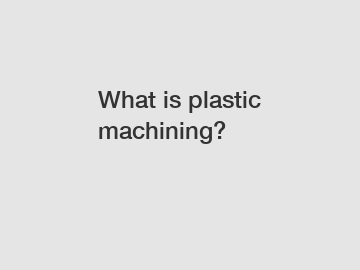What is plastic machining?
Have you ever wondered how everyday objects made from plastic, like the casing of your smartphone or the components of a medical device, come into existence? The answer lies in a process called plastic machining. This technique, combining high precision with advanced technology, allows for the creation of intricate plastic parts used in various industries. In this blog post, we will explore the fascinating world of plastic machining and explain its applications, methods, and advantages.
Plastic machining is a manufacturing technique that involves cutting, shaping, and forming plastic materials into desired shapes and sizes. This process allows for the production of custom parts with high precision and accuracy. Unlike molding processes where plastic is melted and poured into a mold, plastic machining involves removing excess material from a larger piece to create the final product.
Plastic machining can be used to produce a wide range of components and parts for industries such as automotive, aerospace, medical, electronics, and many more. From intricate gears and connectors to intricate medical device parts, plastic machining enables the manufacturing of complex structures that meet specific design requirements.

Now, let's take a closer look at the methods commonly used in plastic machining:
1. CNC Machining: Computer Numerical Control (CNC) machining is a widely used method in plastic machining. It involves the use of computer-controlled machines to precisely cut and shape plastic materials. CNC machines follow pre-programmed instructions, allowing for high levels of automation and accuracy. This method is ideal for producing parts with intricate designs and tight tolerances.
2. Routing: Routing is another common method used in plastic machining. It involves using a router, a rotating cutting tool, to remove excess material from a plastic workpiece. Routing is suitable for both small and large-scale production and can be used to create various shapes and contours in plastic components.
3. Milling: Milling is a process that uses rotary cutters to remove material from a plastic workpiece. It involves moving the cutter in different directions to create the desired shape. Milling machines can operate in multiple axes, allowing for the creation of complex geometries and detailed finishes.
So, why choose plastic machining over other manufacturing techniques? Here are some of the advantages:
1. Precision and Accuracy: Plastic machining offers high precision and accuracy, enabling manufacturers to create parts with tight tolerances. This is crucial in industries where precision is paramount, such as aerospace and medical.
2. Versatility: Plastic machining can work with a wide range of plastic materials, including thermoplastics, thermosetting plastics, and engineered plastics. This versatility allows for the production of parts with varying properties, such as flexibility, rigidity, or chemical resistance.
3. Cost-Effectiveness: Plastic machining can be a cost-effective alternative to other manufacturing processes, especially for low-volume production runs. It eliminates the need for expensive molds or tooling and allows for quick design modifications.
4. Quick Turnaround: Plastic machining offers fast turnaround times, making it ideal for meeting tight deadlines and urgent manufacturing requirements. CNC machines, in particular, can produce parts rapidly and efficiently.
In conclusion, plastic machining is a highly versatile and precise manufacturing process used to create intricate plastic components for a wide range of industries. Its methods, such as CNC machining, routing, and milling, allow for the production of custom parts with high accuracy and efficiency. The advantages of plastic machining, including precision, versatility, cost-effectiveness, and quick turnaround, make it a preferred choice for manufacturers seeking custom plastic solutions.
Next time you pick up your smartphone or use a medical device, take a moment to appreciate the intricate plastic components that bring them to life. Plastic machining truly plays a vital role in shaping the modern world we live in.
Contact us to discuss your requirements of Upe Subgrade Board, Polyethylene Wear-Resistant Guide China Manufacturer, Wholesale Pp Sheet Polypropylene sheets. Our experienced sales team can help you identify the options that best suit your needs.



Comments
0